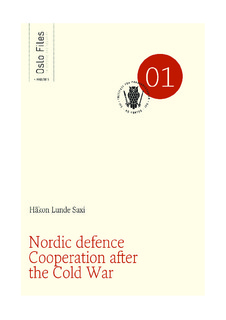| dc.description.abstract | During the Cold War the different alignment choices of the Nordic states meant that military cooperation among them was highly circumscribed, and security issues were taboo in the Nordic Council. Following the events of 1989–91 Nordic defence cooperation intensified, and new institutions were established to facilitate joint deployments, acquisitions, research and development. In the late 2000s there was another surge in Nordic military cooperation which culminated in the organisation Nordic Defence Cooperation (NORDEFCO). The main driver was economic: the Nordic Armed Forces were facing static or shrinking budgets, rising costs, and a demand to take part in new post-Cold War international missions. Given similarities in terms of size, culture and geographical proximity, the Nordic countries are well placed to form a so-called cluster group of NATO/EU countries. Collaboration on military matters could proceed more readily within such a group than would be possible with larger and more heterogeneous organisations. There is, however, no shared Nordic view on ‘hard security’ issues in the Nordic region itself, which suggests that a joint security and defence regime aiming at something close to a Nordic alliance may find it hard to succeed. What NORDEFCO offers is an opportunity to get better value from the Nordic defence budgets by doing more joint research, acquisitions, education, training and deployments. The Swedish, Norwegian and Danish Armed Forces are quite similar in structure, which should facilitate cooperation, but Denmark, for political reasons, has held back. The Finnish Armed Forces would be a somewhat more challenging partner, due to the much larger contingent of inactive reserve forces, while Iceland is mostly excluded due to its lack of proper armed forces. All the Nordic states will face challenges domestically if NORDEFCO advances to the stage at which people need to relocate, changes jobs and industrial contracts move out of the country. If the organisation does reach this stage, it will require deft distributive bargaining by the Nordic governments. | en_US |
